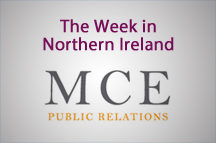 Since devolution was restored to Stormont on 8 May 2007 it is fair to say that things have not always gone smoothly for the devolved region. In the intervening years the words ‘political crisis’ have been used liberally and at times it has felt like the very institutions themselves were hanging by a thread. MLAs have struggled to resolve outstanding issues around flags, parades and the past and executive colleagues have had a number of very public spats.
Since devolution was restored to Stormont on 8 May 2007 it is fair to say that things have not always gone smoothly for the devolved region. In the intervening years the words ‘political crisis’ have been used liberally and at times it has felt like the very institutions themselves were hanging by a thread. MLAs have struggled to resolve outstanding issues around flags, parades and the past and executive colleagues have had a number of very public spats.
It is somewhat of a cliché therefore, to suggest that Stormont is facing a political crisis following Sinn Féin’s volte face this week on the Welfare Reform Bill. Last year the First Minister Peter Robinson publically questioned whether the institutions were fit for purpose but one wonders if this latest political crisis is serious enough to bring the institutions down entirely.
The Bill was due to enter its final stages in the Assembly on Monday but Sinn Féín launched a petition of concern (a mechanism incorporated into Assembly structures to protect minority views) essentially torpedoing the Bill. The DUP, SDLP, UUP and Alliance parties were blindsided by Sinn Féin’s decision to withdraw support for the Bill which was a core component of the Stormont House Agreement (23 December 2014). Peter Robinson blasted Deputy First Minister Martin McGuinness for this move arguing that Sinn Féin had publically endorsed the Agreement and failed to flag up this about turn at their party conference last weekend. Martin McGuinness has argued that they agreed to implement welfare reform only if the most vulnerable claimants were protected.
 Last year the joint First Ministers were given the cold shoulder by President Obama due to their failure to reach an agreement during the Haass negotiations in December 2013. This year it was understood that President Obama would welcome them with open arms to the Oval Office as a ‘well-done’ for getting the Stormont House Agreement over the line. They both attended a previously scheduled trip to America this week, designed to help bring investment to Northern Ireland, though Peter Robinson flew back home to Belfast after one day - saying there were more important issues to resolve at home. It would be difficult to imagine, however, that he will not take up the chance to attend the traditional St Patrick’s Day celebrations in Washington this year.
Last year the joint First Ministers were given the cold shoulder by President Obama due to their failure to reach an agreement during the Haass negotiations in December 2013. This year it was understood that President Obama would welcome them with open arms to the Oval Office as a ‘well-done’ for getting the Stormont House Agreement over the line. They both attended a previously scheduled trip to America this week, designed to help bring investment to Northern Ireland, though Peter Robinson flew back home to Belfast after one day - saying there were more important issues to resolve at home. It would be difficult to imagine, however, that he will not take up the chance to attend the traditional St Patrick’s Day celebrations in Washington this year.
Secretary of State Theresa Villiers has gone into damage limitation mode, insisting during Northern Ireland Question Time this week, that the deal is salvageable and that the institutions are secure. She prefers to describe this week’s developments as a mere ‘bump in the road.’
No-one can deny that the failure to implement Welfare Reform will have serious financial consequences for the region. The Stormont House Agreement had paved the way for the Corporation Tax Bill (NI) to be brought before the Commons. Unless the current difficulties are resolved the progress of that Bill could well be compromised given that its implementation hinged on the Welfare Reform Bill being passed at Stormont.
All this uncertainty has left the electorate wondering whether a snap Assembly election is possible. The cynics would argue that a political crisis suits the two largest parties, the DUP and Sinn Féín, particularly in the run up to an election. That said an Assembly election would only be likely if the First or Deputy First Minister decided to resign. Whether either would sacrifice the institutions so hard fought for, over a piece of legislation that may yet still make it through the Northern Ireland Assembly, will be played out in the next few days.












